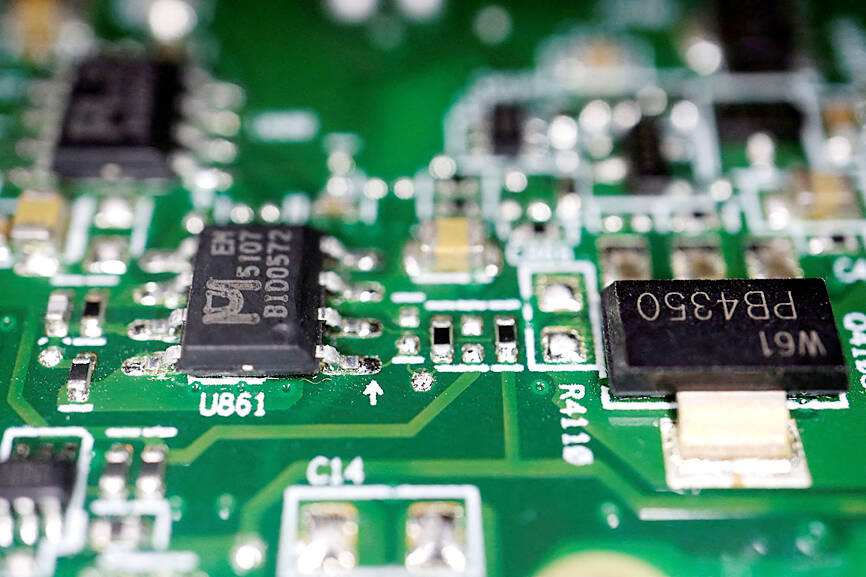Intel Corp is seeking an additional 4 billion to 5 billion euros (US$4.2 billion to US$5.3 billion) in subsidies from the German government to move ahead with a chip manufacturing complex in the eastern part of the country, people familiar with the matter said.
The chip designer had already reached a deal to build a plant in Magdeburg with 6.8 billion euros in government subsidies, subject to approval by the European Commission.
However, it postponed the start of construction on the project at the end of last year due to economic headwinds and is now looking for more aid, the people said.

Photo: Reuters
“Disruptions in the global economy have resulted in increased costs, from construction materials to energy,” the Santa Clara, California-based company said in a statement. “We appreciate the constructive dialogue with the federal government to address the cost gap that exists with building in other locations and make this project globally competitive.”
Under CEO Pat Gelsinger, Intel has embarked on a massive build-out of new production aimed at regaining leadership of the semiconductor industry and helping rebalance the concentration of manufacturing in East Asia.
Its Germany project is facing delays just as the US is pressuring other nations to help keep China’s chipmaking abilities from advancing. Last year, the European Commission announced a plan, called the EU Chips Act, to pour 43 billion euros into the semiconductor industry on the continent. The US similarly laid out a US$50 billion plan to subsidize its own domestic production.
Intel is competing with rivals including Taiwan Semiconductor Manufacturing Co (台積電) and Samsung Electronics Co for the government aid, making early approval of projects vital.
The company announced an expansion across Europe last year that, at the time, was worth 33 billion euros, including a research center in France and an expansion of its existing chip facility in Ireland.
Chief among the plans was the chip production site that Magdeburg would become home to after it outbid other sites across Europe.
However, since Russia invaded Ukraine in February last year, energy prices in Europe have proven extremely volatile and inflation has sent construction costs soaring.
The German Federal Ministry for Economic Affairs and Climate Action declined to comment on its discussions with Intel, but pointed to the EU’s goal of producing 20 percent of the world’s semiconductors by 2030.
“With this goal in mind, the federal government is prepared to support the semiconductor industry in Germany with several billion euros, and to enable new factories to be set up,” it said.
The ministry said that any additional funding would need approval from the European Commission.
Intel had originally estimated that the project in Germany would cost 17 billion euros, but now expects to spend 30 billion, people familiar with the situation said.
Like most projects that are to receive government funding through the EU’s Chips Act, Intel was expecting roughly 40 percent of its project to be subsidized, people familiar with the matter said.
While the company was expecting government funds, it is also open to other sources of government aid, including tax breaks or energy subsidies, they said.
Intel’s expansions in Ireland and France remain largely on track, people familiar with the projects said.

The Eurovision Song Contest has seen a surge in punter interest at the bookmakers, becoming a major betting event, experts said ahead of last night’s giant glamfest in Basel. “Eurovision has quietly become one of the biggest betting events of the year,” said Tomi Huttunen, senior manager of the Online Computer Finland (OCS) betting and casino platform. Betting sites have long been used to gauge which way voters might be leaning ahead of the world’s biggest televised live music event. However, bookmakers highlight a huge increase in engagement in recent years — and this year in particular. “We’ve already passed 2023’s total activity and

Nvidia Corp CEO Jensen Huang (黃仁勳) today announced that his company has selected "Beitou Shilin" in Taipei for its new Taiwan office, called Nvidia Constellation, putting an end to months of speculation. Industry sources have said that the tech giant has been eyeing the Beitou Shilin Science Park as the site of its new overseas headquarters, and speculated that the new headquarters would be built on two plots of land designated as "T17" and "T18," which span 3.89 hectares in the park. "I think it's time for us to reveal one of the largest products we've ever built," Huang said near the

China yesterday announced anti-dumping duties as high as 74.9 percent on imports of polyoxymethylene (POM) copolymers, a type of engineering plastic, from Taiwan, the US, the EU and Japan. The Chinese Ministry of Commerce’s findings conclude a probe launched in May last year, shortly after the US sharply increased tariffs on Chinese electric vehicles, computer chips and other imports. POM copolymers can partially replace metals such as copper and zinc, and have various applications, including in auto parts, electronics and medical equipment, the Chinese ministry has said. In January, it said initial investigations had determined that dumping was taking place, and implemented preliminary

Intel Corp yesterday reinforced its determination to strengthen its partnerships with Taiwan’s ecosystem partners including original-electronic-manufacturing (OEM) companies such as Hon Hai Precision Industry Co (鴻海精密) and chipmaker United Microelectronics Corp (UMC, 聯電). “Tonight marks a new beginning. We renew our new partnership with Taiwan ecosystem,” Intel new chief executive officer Tan Lip-bu (陳立武) said at a dinner with representatives from the company’s local partners, celebrating the 40th anniversary of the US chip giant’s presence in Taiwan. Tan took the reins at Intel six weeks ago aiming to reform the chipmaker and revive its past glory. This is the first time Tan